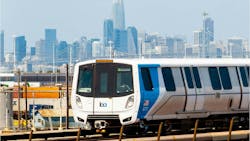BART sustainability report reveals nearly all its contracted energy is greenhouse gas-free
Bay Area Rapid Transit’s (BART) latest Sustainability Report lays out the agency’s sustainability initiatives that intend to improve the rider experience while showcasing its commitment to the environment, community investment and climate resiliency.
“Taking BART even once a month is a small gift you can give to the environment and your community,” said BART General Manager Bob Powers. “Despite the financial challenges that lie ahead, BART is approaching the coming decades with optimism and excitement. We can’t afford to lose transit—it is essential for a sustainable, connected Bay Area.”
Obtained from mainly renewable energy, the report shows that nearly 90% of BART’s contracted electricity in the previous year came from greenhouse gas–free sources. The agency found that taking its service in lieu of driving saves 25.1 pounds of carbon dioxide emissions on average.
Highlights from the report include:
- Green energy and infrastructure: BART says it furthered efficiency by installing more LED lighting at stations and parking lots, and continued escalator rehabilitation projects that use sustainable materials.
- Seismic safety: The agency finished its multi-year Earthquake Safety Program, which had it retrofit core infrastructure like the Transbay Tube so the system can stand up to and recover quickly from major earthquakes.
- Electric vehicle (EV) expansion: BART achieved over $24 million in grants to expand EV charging access across its stations, making EV ownership easier for riders and nearby residents.
- Transit-oriented development (TOD): Nearby projects, like Casa Sueños, a new TOD at Fruitvale Station, completed 179 new housing units and 6,000 square feet of retail space, furthering the agency’s goal to connect residents to jobs, schools and the broader community while reducing the need for a car.
- Community engagement: Employees launched the BART Green Team, an initiative which organizes sustainability events like tree plantings and shoreline cleanups, and hosted a fashion show featuring creations by students using retired BART paper tickets.
